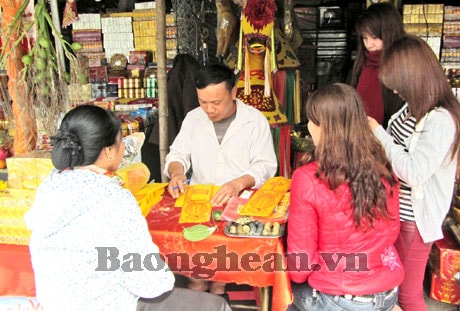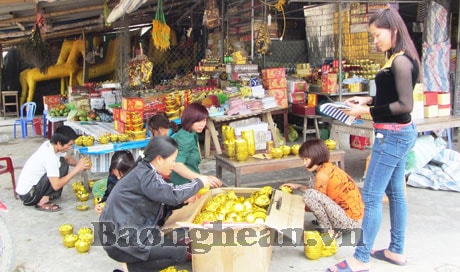Making a living at the Buddha's door
Many professions depend on temples, pagodas, and shrines to survive. From shamans, writing prayers, selling incense, candles, paper money, exchanging money, parking lots, to begging. Few people can remember when these professions were born. All we know is that more and more people are participating, and January is their best month of the year…
(Baonghean) -Many professions depend on temples, pagodas, and shrines to survive. From shamans, writing prayers, selling incense, candles, paper money, exchanging money, parking lots, to begging. Few people can remember when these professions were born. All we know is that more and more people are participating, and January is their best month of the year…
It is difficult to count the number of people who earn a living around temples and pagodas in the whole province. Just in the area of Hong Son Temple, Can Linh Pagoda, King Quang Trung Temple (Vinh City) and Ong Hoang Muoi Temple (Hung Thinh Commune, Hung Nguyen), there are many people ready to serve all different needs of visitors.
In recent years, Ong Hoang Muoi Temple has attracted a lot of tourists. Therefore, on normal days, there are dozens of kiosks around Ong Hoang Muoi Temple that regularly sell goods to serve tourists. According to the Ong Hoang Muoi Temple Management Board, visitors come to the temple for many reasons, some to visit the temple, but even more to pray for luck, fortune, peace, etc. Visitors to the temple, at least buy a few incense sticks, while those who come to pray for luck, fortune, peace, etc. need to have their petitions written, their offerings bought, someone to worship, someone to watch their vehicles, etc. Therefore, there must be a business force to serve the needs of visitors.
Selling offerings, writing petitions, exchanging money at Ong Hoang Muoi temple.
Walking around the business area around Ong Hoang Muoi Temple, we see that the staff serving the needs of visitors to the temple is very large and the items are extremely diverse. From candy, fruit, incense, gold, cakes, gold branches and jade leaves, votive objects such as cars, motorbikes, clothes, shoes, houses, elephants, horses to small and cute souvenirs such as the twelve zodiac animals, fake ancient money, jade bracelets... Along with these shops, there are many tables for writing prayers, changing small bills, shamans, parking lots and motels...
Asking about the prices of the offerings, we learned that there are many different ranges depending on the needs of the customers. Ms. H, a business owner, said: A small offering tray with incense, gold coins, cakes, and fruits costs at least 50,000 - 70,000 VND, and larger ones can cost up to a few million VND. According to Ms. H, customers in the province usually only make small, simple offerings, but if they are customers from the North, it is different, they often make large offerings, accompanied by elaborate votive offerings costing up to five or seven million VND. The service of writing petitions and worshiping also has different prices. At the temple, there are 2 permanent shamans who write petitions with specific prices. For those who are not on the "staff" of the temple management board, the price is different, from 30,000 VND to a few hundred thousand VND/turn. The service of exchanging small change is similar. Some places exchange 10 for 9, some places exchange 10 for 8.
At Can Linh Pagoda, on the full moon and new moon days, especially on New Year's Eve, there are many people providing services. Most of the businesses here do it in a "take advantage" manner, so the unit price does not follow any regulations. Normally, keeping a motorbike costs about 3,000 VND/time. Here it is 5,000 VND, even on New Year's Eve it is 10,000 VND/time. Anyone who questions will be "scolded" because "it's lucky to have someone watching your motorbike at night, so why bother?" Similarly, with the prices of various offerings, the seller will "identify" according to the customer's manner to "cut them off" as they see fit.
At Hong Son Temple (Hong Son Ward, Vinh City), the types of businesses serving tourists are directly managed by the Temple Management Board. In the temple area, there is a parking lot, 6 shamans, 3 regular business locations and 10 business locations on the 15th and 1st of the lunar month. Prices for services such as writing petitions, performing ceremonies, worshiping, parking, etc. all have a common price and are publicly listed. However, on New Year's Eve and the first days of the new year, it is different. In the temple yard, the number of service providers does not increase, but outside the fence there are many people participating in "taking advantage of doing business during Tet". And just like at Can Linh Pagoda, they set their own prices and adjust accordingly depending on the customers... According to Ms. P, a business owner who has been at the temple for many years, on New Year's Eve or the first days of the new year, the psychology of customers is usually quite comfortable, so it is rare for people to haggle over prices with the traders and service providers around the temple.
The emergence of services to serve the needs of visitors in temple areas is inevitable. However, it also comes with many negative aspects. At Ong Hoang Muoi Temple, environmental pollution from various types of services is becoming a problem. In addition, there are many people practicing superstition, begging... According to Mr. Truong Van Thai - Head of Ong Hoang Muoi Temple Management Board, although the temple regularly reminds people, the awareness of hygiene of businesses and visitors to the temple is very poor. Regarding the shaman force, there are many "shamans" who do not know anything about the "profession" but still practice, making visitors to the temple very upset because their needs are not properly met. The temple has requested the cultural sector to organize training courses, and those who are qualified will be granted practice certificates, but this has not been resolved yet...
At Can Linh Pagoda, Hong Son Temple... there are no superstitious people, but there is environmental pollution and many beggars. According to Mr. Ho Cong Tien - Deputy Manager of Hong Son Temple, the temple can only manage the temple area and cannot manage the outside. To do this well, it depends on the local government and the awareness of those involved in the business and tourists...
As life improves and the need for spiritual activities becomes more and more popular, the number of practitioners at temples, pagodas, etc. is increasing. This is a good thing because it creates jobs and income for a part of the population. However, in order for temples and pagodas to truly be sacred places in the eyes of everyone, local authorities need to coordinate well with temple and pagoda management boards, etc. to strictly manage these subjects.
Nhat Lan






